| Listing 1 - 10 of 14 | << page >> |
Sort by
|
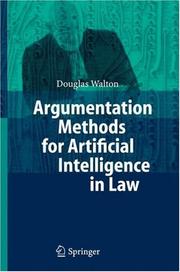
ISBN: 1280235020 9786610235025 3540278818 3540251871 3642064329 Year: 2005 Publisher: Berlin ; New York : Springer,
Abstract | Keywords | Export | Availability | Bookmark
 Loading...
Loading...Choose an application
- Reference Manager
- EndNote
- RefWorks (Direct export to RefWorks)
During a recent visit to China to give an invited lecture on legal argumentation I was asked a question about conventional opinion in western countries. If legal r- soning is thought to be important by those both inside and outside the legal prof- sion, why does there appear to be so little attention given to the study of legal logic? This was a hard question to answer. I had to admit there were no large or well-established centers of legal logic in North America that I could recommend as places to study. Going through customs in Vancouver, the customs officer asked what I had been doing in China. I told him I had been a speaker at a conf- ence. He asked what the conference was on. I told him legal logic. He asked 1 whether there was such a thing. He was trying to be funny, but I thought he had a good point. People will question whether there is such a thing as “legal logic”, and some recent very prominent trials give the question some backing in the common opinion. But having thought over the question of why so little attention appears to be given to legal logic as a mainstream subject in western countries, I think I now have an answer. The answer is that we have been looking in the wrong place.
Law --- Information storage and retrieval systems --- Evidence (Law) --- Artificial intelligence. --- Expert systems (Computer science) --- Methodology --- Automation. --- Law. --- Knowledge-based systems (Computer science) --- Systems, Expert (Computer science) --- Artificial intelligence --- Computer systems --- Soft computing --- AI (Artificial intelligence) --- Artificial thinking --- Electronic brains --- Intellectronics --- Intelligence, Artificial --- Intelligent machines --- Machine intelligence --- Thinking, Artificial --- Bionics --- Cognitive science --- Digital computer simulation --- Electronic data processing --- Logic machines --- Machine theory --- Self-organizing systems --- Simulation methods --- Fifth generation computers --- Neural computers --- Extrinsic evidence --- Parol evidence --- Trial evidence --- Actions and defenses --- Judicial process --- Trial practice --- Estoppel --- Legal literature searching --- Acts, Legislative --- Enactments, Legislative --- Laws (Statutes) --- Legislative acts --- Legislative enactments --- Jurisprudence --- Legislation --- Logic. --- Philosophy of law. --- Theories of Law, Philosophy of Law, Legal History. --- Philosophy of Law. --- Argumentation --- Deduction (Logic) --- Deductive logic --- Dialectic (Logic) --- Logic, Deductive --- Intellect --- Philosophy --- Psychology --- Science --- Reasoning --- Thought and thinking --- Law—Philosophy. --- Political science. --- Administration --- Civil government --- Commonwealth, The --- Government --- Political theory --- Political thought --- Politics --- Science, Political --- Social sciences --- State, The --- Philosophy. --- History. --- Legal history --- History and criticism
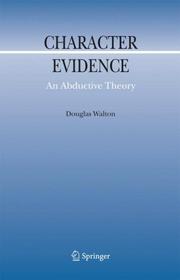
ISBN: 128106744X 9786611067441 1402049439 1402049420 9048172357 Year: 2006 Volume: v. 11 Publisher: Dordrecht : Springer,
Abstract | Keywords | Export | Availability | Bookmark
 Loading...
Loading...Choose an application
- Reference Manager
- EndNote
- RefWorks (Direct export to RefWorks)
This book is on evidence for character judgments, answering questions about how such judgments are and should be supported or refuted by verifiable evidence. For example, if I claim that some particular person has integrity, or does not, what kind of justification should properly be used to support or refute the claim? This book answers the question using a model of abductive reasoning, commonly called inference to the best explanation. The methodology of the book derives from recent work on models of reasoning in argumentation theory and artificial intelligence. The aim is not just to show how character judgments are made, but to show how they should be properly be made based on sound reasoning, in order to avoid errors and superficial judgments of a kind that are common. Character evidence in law is on a razor’s edge. It is generally inadmissible, for it might tend to prejudice a jury, but it is a kind of evidence often needed in trials, for example, to cross-examine a witness. This book shows that we are not as good at judging character as we think, and often make serious mistakes. But it is shown how character judgments can, in some instances, be based on good reasoning supported by factual evidence in a case.
Reputation (Law) --- Examination of witnesses --- Abduction (Logic) --- Artificial intelligence. --- Psychological aspects. --- AI (Artificial intelligence) --- Artificial thinking --- Electronic brains --- Intellectronics --- Intelligence, Artificial --- Intelligent machines --- Machine intelligence --- Thinking, Artificial --- Bionics --- Cognitive science --- Digital computer simulation --- Electronic data processing --- Logic machines --- Machine theory --- Self-organizing systems --- Simulation methods --- Fifth generation computers --- Neural computers --- Logic --- Reasoning --- Syllogism --- Evidence (Law) --- Trial practice --- Witnesses --- Evidence, Character --- Fama publica --- Character evidence --- Law and legislation --- Philosophy of law. --- Criminal Law. --- Philosophy of Law. --- Theories of Law, Philosophy of Law, Legal History. --- Criminal Law and Criminal Procedure Law. --- Crime --- Crimes and misdemeanors --- Criminals --- Law, Criminal --- Penal codes --- Penal law --- Pleas of the crown --- Public law --- Criminal justice, Administration of --- Criminal procedure --- Legal status, laws, etc. --- Political science. --- Law—Philosophy. --- Law. --- Criminal law. --- Acts, Legislative --- Enactments, Legislative --- Laws (Statutes) --- Legislative acts --- Legislative enactments --- Jurisprudence --- Legislation --- Administration --- Civil government --- Commonwealth, The --- Government --- Political theory --- Political thought --- Politics --- Science, Political --- Social sciences --- State, The
Multi
ISBN: 9780521886178 9780521713801 0521886171 0521713803 9780511808630 0511409354 9780511409356 9780511409899 0511409893 9780511407994 0511407998 0511808631 9786611717063 6611717064 1107086574 1107186692 1281717061 0511407254 0511408781 9781107086579 9781107186699 9781281717061 9780511407253 9780511408786 Year: 2008 Publisher: Cambridge New York Cambridge University Press
Abstract | Keywords | Export | Availability | Bookmark
 Loading...
Loading...Choose an application
- Reference Manager
- EndNote
- RefWorks (Direct export to RefWorks)
Second edition of the introductory guidebook to the basic principles of constructing sound arguments and criticising bad ones. Non-technical in approach, it is based on 186 examples, which Douglas Walton, a leading authority in the field of informal logic, discusses and evaluates in clear, illustrative detail. Walton explains how errors, fallacies, and other key failures of argument occur. He shows how correct uses of argument are based on sound strategies for reasoned persuasion and critical responses. This edition takes into account many developments in the field of argumentation study that have occurred since 1989, many created by the author. Drawing on these developments, Walton includes and analyzes 36 new topical examples and also brings in work on argumentation schemes. Ideally suited for use in courses in informal logic and introduction to philosophy, this book will also be valuable to students of pragmatics, rhetoric, and speech communication.
Logic --- Logique --- Raisonnement --- Argumentation --- Logic. --- Reasoning. --- Reasoning --- Ratiocination --- Reason --- Thought and thinking --- Judgment (Logic) --- Deduction (Logic) --- Deductive logic --- Dialectic (Logic) --- Logic, Deductive --- Intellect --- Philosophy --- Psychology --- Science --- Methodology --- Logique. --- Raisonnement. --- Argumentation. --- Arts and Humanities
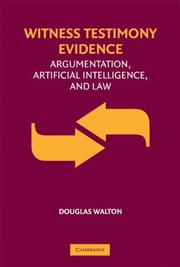
ISBN: 9780521707701 9780521881432 0521881439 0521707706 9780511619533 1107185041 1281146404 0511367171 9786611146405 0511366558 0511574193 0511619537 0511365926 0511367767 9780511367762 9780511367175 9781281146403 Year: 2008 Publisher: Cambridge New York Cambridge University Press
Abstract | Keywords | Export | Availability | Bookmark
 Loading...
Loading...Choose an application
- Reference Manager
- EndNote
- RefWorks (Direct export to RefWorks)
Recent work in artificial intelligence has increasingly turned to argumentation as a rich, interdisciplinary area of research that can provide new methods related to evidence and reasoning in the area of law. Douglas Walton provides an introduction to basic concepts, tools and methods in argumentation theory and artificial intelligence as applied to the analysis and evaluation of witness testimony. He shows how witness testimony is by its nature inherently fallible and sometimes subject to disastrous failures. At the same time such testimony can provide evidence that is not only necessary but inherently reasonable for logically guiding legal experts to accept or reject a claim. Walton shows how to overcome the traditional disdain for witness testimony as a type of evidence shown by logical positivists, and the views of trial sceptics who doubt that trial rules deal with witness testimony in a way that yields a rational decision-making process.
Law --- Witnesses. --- Evidence (Law) --- Reasoning. --- Artificial intelligence. --- Relevance (Philosophy) --- Droit --- Témoins --- Preuve (Droit) --- Raisonnement --- Intelligence artificielle --- Pertinence (Logique) --- Methodology. --- Méthodologie --- Evidence (Law). --- Relevance (Philosophy). --- Témoins --- Méthodologie --- Arts and Humanities --- Philosophy --- AI (Artificial intelligence) --- Artificial thinking --- Electronic brains --- Intellectronics --- Intelligence, Artificial --- Intelligent machines --- Machine intelligence --- Thinking, Artificial --- Bionics --- Cognitive science --- Digital computer simulation --- Electronic data processing --- Logic machines --- Machine theory --- Self-organizing systems --- Simulation methods --- Fifth generation computers --- Neural computers --- Argumentation --- Ratiocination --- Reason --- Thought and thinking --- Judgment (Logic) --- Logic --- Extrinsic evidence --- Parol evidence --- Trial evidence --- Actions and defenses --- Judicial process --- Trial practice --- Estoppel --- Testimony --- Eyewitness identification --- Legal reasoning
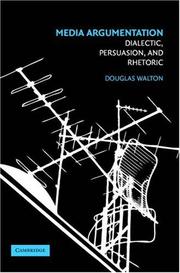
ISBN: 9780521700306 9780521876902 0521876907 0521700302 9780511619311 0511619316 9780511355738 0511355734 1281153516 9781281153517 1107182794 9781107182790 9786611153519 6611153519 0511355211 9780511355219 0511354118 9780511354113 0511573944 9780511573941 051135469X Year: 2007 Publisher: Cambridge New York Cambridge University Press
Abstract | Keywords | Export | Availability | Bookmark
 Loading...
Loading...Choose an application
- Reference Manager
- EndNote
- RefWorks (Direct export to RefWorks)
Media argumentation is a powerful force in our lives. From political speeches to television commercials to war propaganda, it can effectively mobilize political action, influence the public, and market products. This book presents a new and systematic way of thinking about the influence of mass media in our lives, showing the intersection of media sources with argumentation theory, informal logic, computational theory, and theories of persuasion. Using a variety of case studies that represent arguments that typically occur in the mass media, Douglas Walton demonstrates how tools recently developed in argumentation theory can be usefully applied to the identification, analysis, and evaluation of media arguments. He draws upon the most recent developments in artificial intelligence, including dialogical theories of argument, which he developed, as well as speech act theory. Each chapter presents solutions to problems central to understanding, analyzing, and criticizing media argumentation.
#KVHA:Taalkunde --- #KVHA:Argumentatie --- #KVHA:Retoriek --- #KVHA:Overtuigen --- #KVHA:Media --- Fallacies (Logic) --- Mass media. --- Reasoning. --- Fallacies (Logic). --- Mass media --- Reasoning --- Argumentation --- Ratiocination --- Reason --- Thought and thinking --- Judgment (Logic) --- Logic --- Mass communication --- Media, Mass --- Media, The --- Communication --- Errors, Logical --- Sophisms (Logic) --- Sophistry (Logic) --- Arts and Humanities --- Philosophy
Book
ISBN: 9027250057 9786613358905 1283358905 9027278903 9789027250056 Year: 1987 Volume: 4 Publisher: Amsterdam ; Philadelphia : J. Benjamins Pub. Co.,
Abstract | Keywords | Export | Availability | Bookmark
 Loading...
Loading...Choose an application
- Reference Manager
- EndNote
- RefWorks (Direct export to RefWorks)
The basic question of this monograph is: how should we go about judging arguments to be reasonable or unreasonable? Our concern will be with argument in a broad sense, with realistic arguments in natural language. The basic object will be to engage in a normative study of determining what factors, standards, or procedures should be adopted or appealed to in evaluating an argument as "good," "not-so-good," "open to criticism," "fallacious," and so forth. Hence our primary concern will be with the problems of how to criticize an argument, and when a criticism is reasonably justified.
Logic --- Sofismen --- Logique --- Sophismes --- Logica. --- Fallacies (Logic) --- Logic. --- Argumentation --- Deduction (Logic) --- Deductive logic --- Dialectic (Logic) --- Logic, Deductive --- Intellect --- Philosophy --- Psychology --- Science --- Reasoning --- Thought and thinking --- Errors, Logical --- Sophisms (Logic) --- Sophistry (Logic) --- Judgment (Logic) --- Methodology
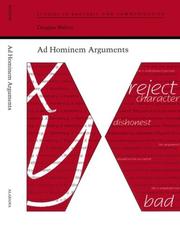
ISBN: 0817391142 0585217742 9780585217741 9780817391140 0817309225 9780817309220 9780817355616 Year: 1998 Publisher: Tuscaloosa University of Alabama Press
Abstract | Keywords | Export | Availability | Bookmark
 Loading...
Loading...Choose an application
- Reference Manager
- EndNote
- RefWorks (Direct export to RefWorks)
Reasoning. --- Persuasion (Rhetoric) --- Ad hominem arguments. --- Argumentation --- Ratiocination --- Reason --- Thought and thinking --- Judgment (Logic) --- Logic --- Rhetoric --- Forensics (Public speaking) --- Oratory --- Fallacies (Logic) --- Philosophical anthropology --- General ethics
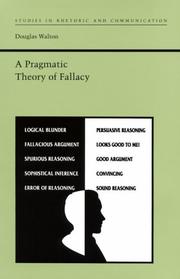
ISBN: 0585201609 9780585201603 0817307982 9780817307981 Year: 1995 Publisher: Tuscaloosa University of Alabama Press
Abstract | Keywords | Export | Availability | Bookmark
 Loading...
Loading...Choose an application
- Reference Manager
- EndNote
- RefWorks (Direct export to RefWorks)
Although many individual fallacies have now been studied and analyzed in the growing literature on argumentation, the concept of fallacy itself has lacked a sufficiently clear meaning to make it as useful as it could be for evaluating arguments. Walton looks at how an argument is used in the context of conversation. He defines a fallacy as a conversational move, or sequence of moves, that is supposed to be an argument that contributes to the purpose of the conversation but in reality interferes with it. The view is a pragmatic one, based on the assumption that when people argue, they do so in a context of dialogue, a conventionalized normative framework that is goal-directed. Such a contextual framework is shown to be crucial in determining whether an argument has been used correctly. Three problems are those of fallacy identification, fallacy analysis, and fallacy evaluation. Walton presents solutions for all three problems by developing new pragmatic structures to display the form of an argument (the so-called argumentation scheme). The fallacy is revealed when it is shown, in a given case, how its form fits into an enveloping normative structure of dialogue. In this book Walton shows how the 25 or so major informal fallacies standardly treated in textbooks are basically reasonable presumptive types of arguments that have been used inappropriately in such a normative model. Another key feature of the book is its demonstration that a fallacy is typically an argument that seems correct when it is not. Walton shows that such an argument is used in a way that disguises a covert, illicit shift from one type of dialogue to another. This novel approach to solving the analysis problem provides a pragmatic way of analyzing a fallacy as a deceptive type of argumentation with an appearance of correctness. Walton suggests that different contexts of dialogue are involved and that fallacies are often associated with a partially concealed illicit shift from one type of dialogue to another.
Fallacies (Logic) --- Logic --- Philosophy --- Philosophy & Religion --- Errors, Logical --- Sophisms (Logic) --- Sophistry (Logic) --- Judgment (Logic) --- Reasoning
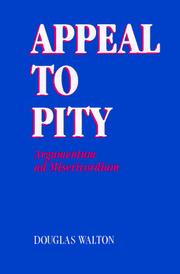
ISBN: 0585062196 9780585062198 0791434613 0791434621 Year: 1997 Publisher: Albany, N.Y. State University of New York Press
Abstract | Keywords | Export | Availability | Bookmark
 Loading...
Loading...Choose an application
- Reference Manager
- EndNote
- RefWorks (Direct export to RefWorks)
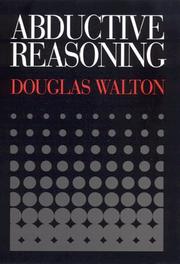
ISBN: 0817387617 9780817387617 0817314415 9780817314415 Year: 2004 Publisher: Tuscaloosa, Ala.
Abstract | Keywords | Export | Availability | Bookmark
 Loading...
Loading...Choose an application
- Reference Manager
- EndNote
- RefWorks (Direct export to RefWorks)
This book examines three areas in which abductive reasoning is especially important: medicine, science, and law. The reader is introduced to abduction and shown how it has evolved historically into the framework of conventional wisdom in logic. Discussions draw upon recent techniques used in artificial intelligence, particularly in the areas of multi-agent systems and plan recognition, to develop a dialogue model of explanation. Cases of causal explanations in law are analyzed using abductive reasoning, and all the components are finally brought together to build a new account of abd
Reasoning. --- Abduction (Logic) --- Logic --- Reasoning --- Syllogism --- Argumentation --- Ratiocination --- Reason --- Thought and thinking --- Judgment (Logic)
| Listing 1 - 10 of 14 | << page >> |
Sort by
|

 Search
Search Feedback
Feedback About UniCat
About UniCat  Help
Help News
News